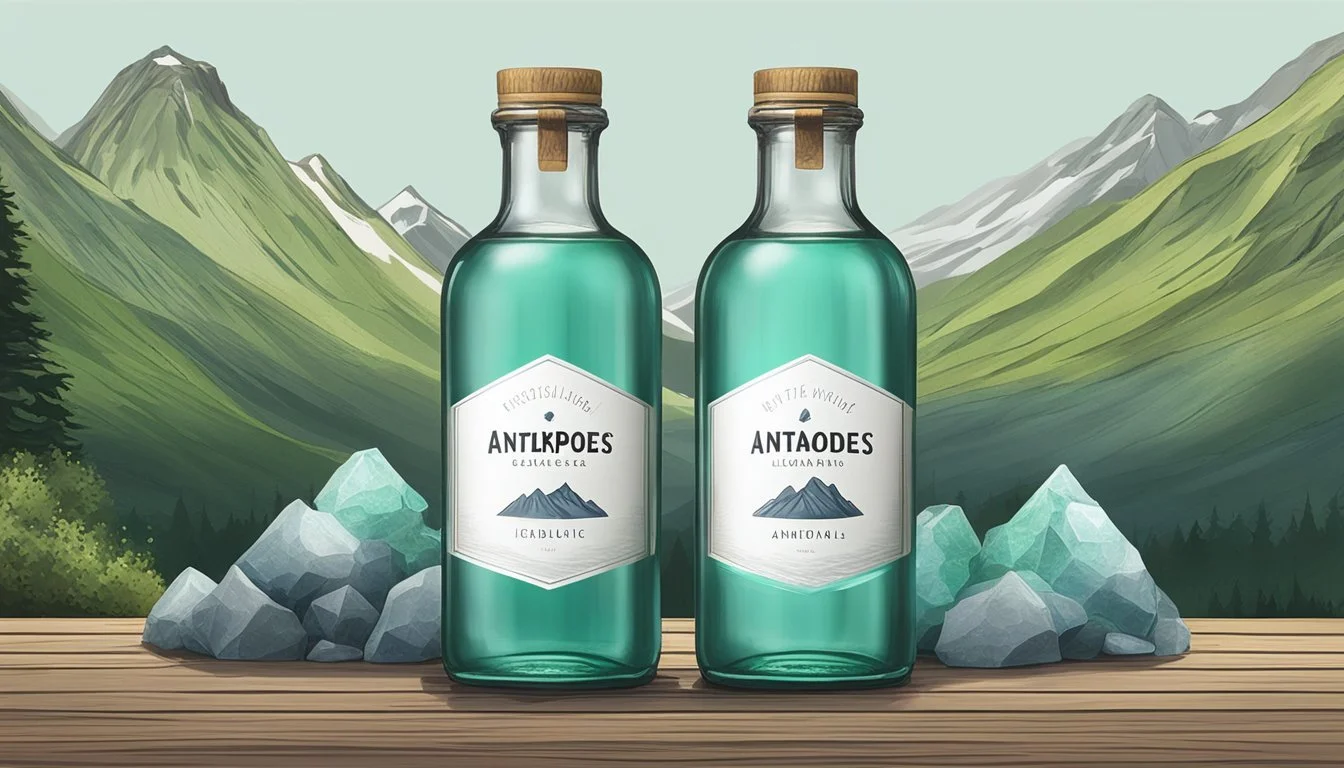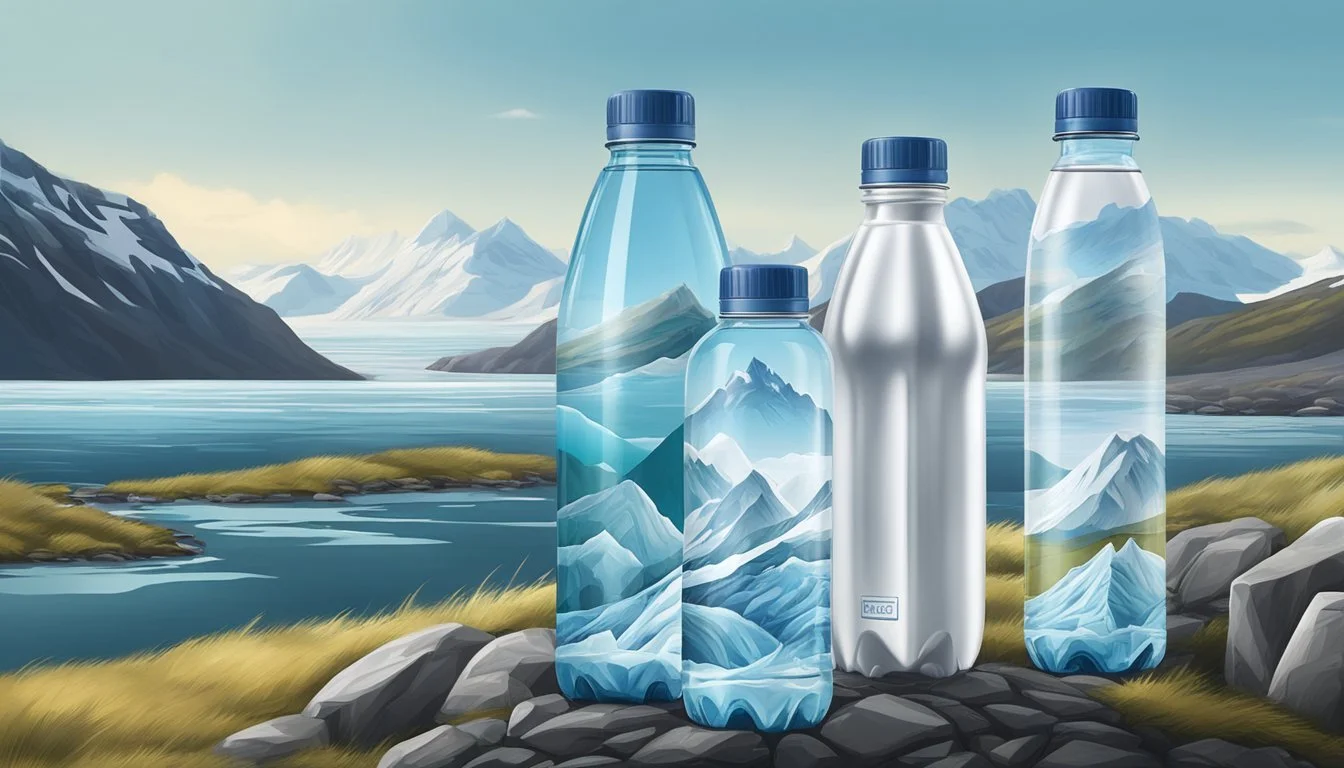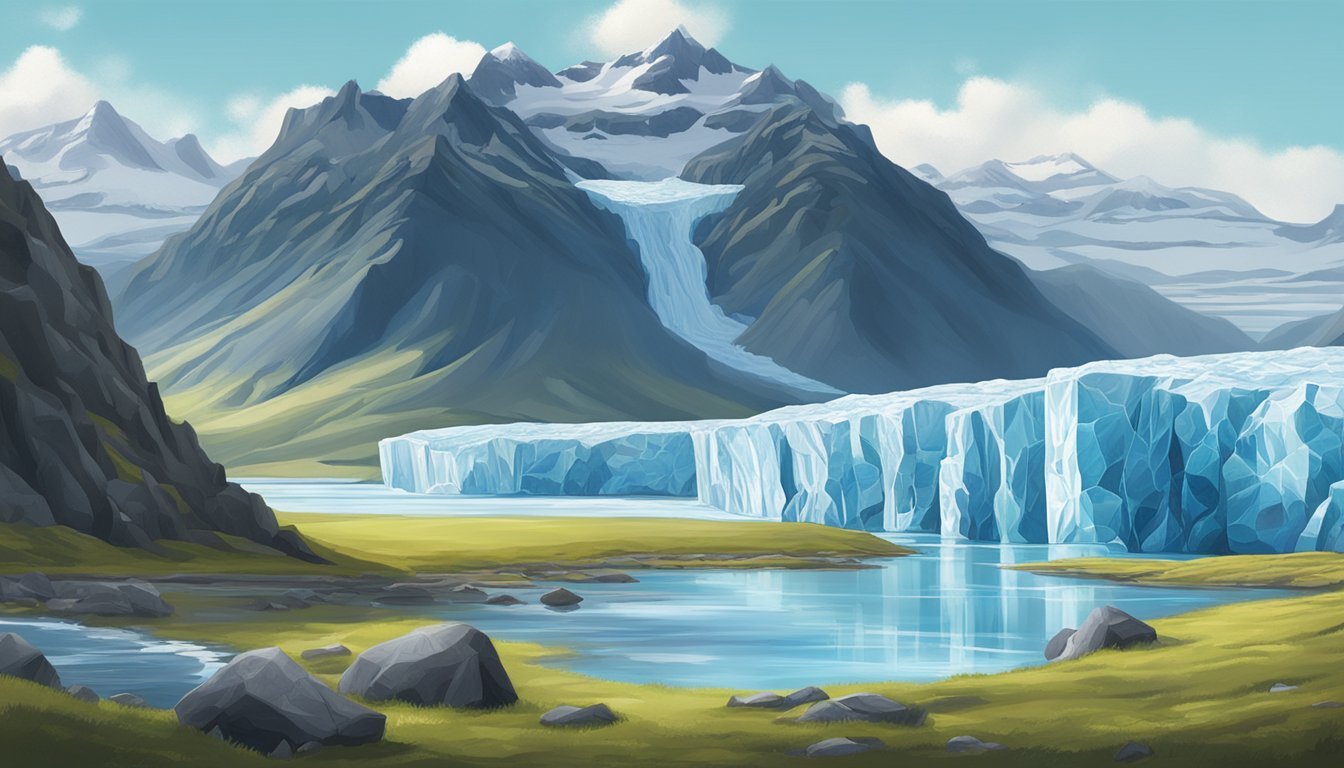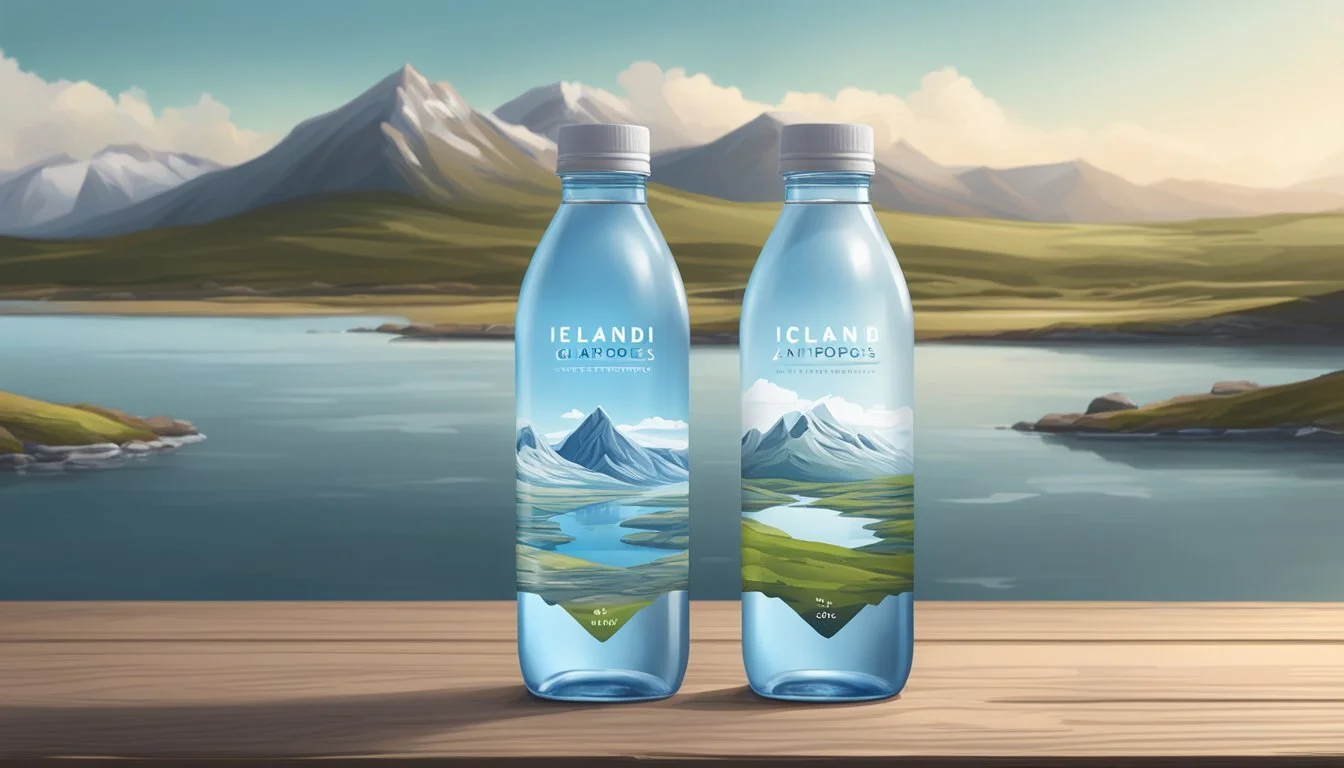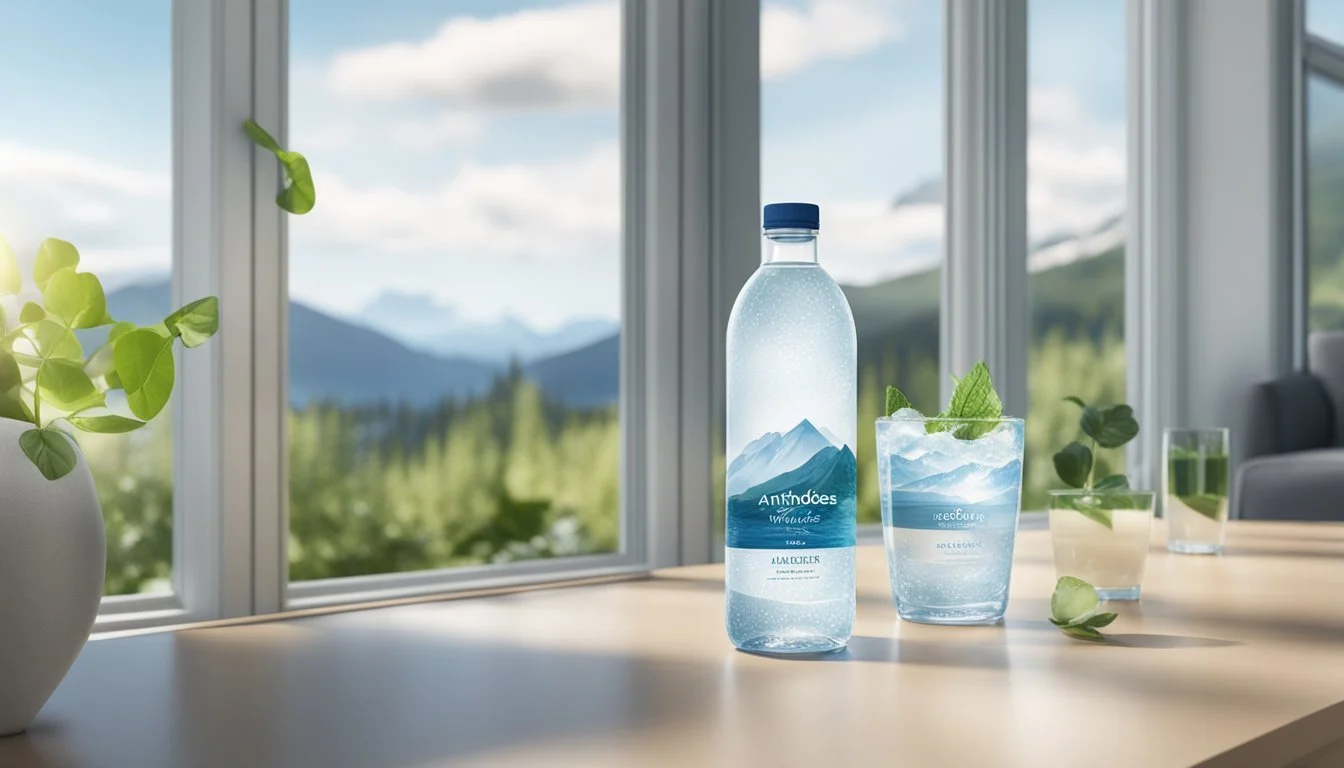Icelandic Glacial vs. Antipodes
Comparing Premium Bottled Waters
Bottled waters come in many varieties, but two brands often in the spotlight are Icelandic Glacial and Antipodes. Icelandic Glacial, marketed for its purity and balanced mineral content, boasts a high alkaline level with a pH of 8.4. This brand promises clean, refreshing hydration, drawn from Iceland’s pristine natural springs, making it a favorite among those who seek both quality and exceptional taste.
Antipodes, hailing from New Zealand, offers its own unique selling points. Known for its soft, subtle mouthfeel and low mineral content, Antipodes water is sourced from an aquifer located hundreds of feet underground. This deep-source water is celebrated for its purity and natural filtration process, free from heavy minerals, delivering a neutral yet crisp experience that many consumers appreciate.
When deciding which bottled water is superior, the choice highly depends on individual preferences. If someone prefers a mineral-rich, slightly alkaline taste, Icelandic Glacial stands out. On the other hand, those who lean towards a softer, cleaner taste with minimal mineral interference might find Antipodes to be the better choice.
Understanding Bottled Water
Bottled water has become a popular choice for many seeking convenient and pure hydration. There are several types of bottled water, including spring water, mineral water, and purified water. Each category offers different benefits based on its source and treatment process.
Spring water comes from natural springs and is often filtered naturally through rock formations. This process can impart beneficial minerals such as calcium and magnesium.
Mineral water contains a specified amount of mineral content and is usually sourced from mineral springs. The minerals in this type of water contribute to its unique taste.
Purified water, which includes distilled and reverse osmosis water, has had impurities removed through various filtration methods. This type of water is often free from contaminants but may lack natural minerals.
Brands play a significant role in the bottled water industry. Premium brands, like Icelandic Glacial and Antipodes, highlight their sources and purification methods. Icelandic Glacial comes from the Olfusa spring in Iceland, known for its purity and high pH level. Antipodes, on the other hand, is sourced from an aquifer beneath New Zealand's Bay of Plenty.
The filtration process is crucial in determining water quality. Icelandic Glacial water is filtered through volcanic rock, which offers natural purification. Antipodes uses a fine filtration system ensuring clear and clean water.
Hydration and health benefits are key considerations when choosing bottled water. The availability of essential minerals can support bone health and hydration. Both Icelandic Glacial and Antipodes provide clean and refreshing options for staying hydrated.
Understanding these aspects helps in making an informed choice tailored to individual health and taste preferences.
Icelandic Glacial and Antipodes Overview
Icelandic Glacial and Antipodes are two prominent bottled water brands known for their unique sources and brand philosophies. They differ significantly in origin, environmental impact, and market presence.
Origin and Source
Icelandic Glacial draws its water from the famed Ölfus Spring in Iceland, formed over 5,000 years ago after a volcanic eruption. The water naturally filters through lava rock, resulting in a high pH level of 8.4. This continuous renewal ensures a sustainable supply.
Antipodes, on the other hand, sources its water from an ancient aquifer in New Zealand. The water is naturally mineral-rich and undergoes a geological filtration process, contributing to its purity and unique taste profile. The brand emphasizes its untouched and pristine source.
Brand Philosophies
Icelandic Glacial commits to sustainability and environmental responsibility. It was the first bottled water brand to receive CarbonNeutral certification. Their bottling process at a state-of-the-art facility minimizes environmental impact by using only a small percentage of the available water, ensuring minimal disruption to the natural flow.
Antipodes also prioritizes sustainability, touting its ground-to-bottle approach. It ensures the water is bottled directly at the source, reducing the carbon footprint. The brand highlights its commitment to providing natural and pure water with minimal environmental disturbance.
Market Presence
Icelandic Glacial has established a strong market presence, particularly in North America and Europe. The brand is widely available in grocery stores and online platforms, often promoted for its high pH and purity.
Antipodes enjoys considerable popularity in Australasia and parts of the luxury market globally. The brand is often found in high-end restaurants and hotels, catering to discerning consumers who value its premium quality and taste. Antipodes emphasizes its boutique nature, creating a niche market appeal.
Quality and Purity
Icelandic Glacial and Antipodes are renowned for their exceptional purity and commitment to stringent quality standards. This review explores the specifics of mineral content, testing and safety measures, and natural filtration processes that define their superiority.
Mineral Content
Mineral content is critical for evaluating bottled water quality. Icelandic Glacial water contains notable amounts of calcium, magnesium, and potassium, contributing to its unique taste and hydration benefits. The total dissolved solids (TDS) level in Icelandic Glacial is relatively low, indicating minimal impurities.
Antipodes also boasts a balanced mineral profile, with a higher emphasis on magnesium and calcium that cater to health-conscious individuals. The refined taste and health benefits offered by these minerals make both brands stand out in the premium bottled water market.
Testing and Safety
Rigorous testing for contaminants and adherence to FDA regulations ensure the safety and purity of both brands. Icelandic Glacial subjects its water to frequent quality reports analyzing for harmful substances like microplastic particles and PFAS chemicals. This meticulous approach maintains the brand's reputation for high-quality, safe-to-drink water.
Antipodes follows a similar regimen of comprehensive testing. Their water undergoes stringent safety evaluations for a range of contaminants, ensuring compliance with international water quality standards. This commitment to safety and transparency reassures consumers of the product's reliability and trustworthiness.
Natural Filtration Process
Both Icelandic Glacial and Antipodes leverage natural filtration processes to maintain the purity of their water. Icelandic Glacial water is naturally filtered through layers of volcanic rock, which imparts a high level of purity and a distinct, refreshing taste.
Antipodes sources its water from deep, artesian wells, where it undergoes natural filtration through mineral-rich strata. This unique geological process provides Antipodes water with its signature clarity and natural mineral balance. The reliance on organic, slow filtration methods distinguishes both brands as leaders in maintaining the highest standards of bottled water purity.
Health and Hydration Benefits
For consumers choosing between Icelandic Glacial and Antipodes, understanding the key health and hydration benefits of each can make a significant difference. This includes aspects such as pH level for body balance and essential electrolytes and minerals.
pH Level and Body Balance
Icelandic Glacial boasts an alkaline pH level, typically above 8.0, which some believe helps in maintaining the body's optimal pH balance. This high alkalinity could counteract acidity in the body, potentially offering benefits for those looking to enhance their overall health.
Antipodes, sourced from New Zealand, also maintains a neutral to slightly alkaline pH. The specific pH level might vary slightly depending on the batch but generally falls within a healthy range, making it suitable for daily consumption.
Electrolytes and Minerals
Icelandic Glacial water provides a balanced mineral profile that includes low concentrations of calcium (5.7 mg/L), magnesium (2.2 mg/L), and sodium (11 mg/L). These essential minerals play crucial roles in bodily functions such as bone health, muscle function, and hydration levels.
Antipodes, on the other hand, is celebrated for its pure and uncontaminated source, ensuring natural filtration through volcanic rock. This process enriches the water with natural electrolytes and minerals that are vital for maintaining proper hydration and supporting metabolic functions.
Whether choosing Icelandic Glacial or Antipodes, the presence of these electrolytes and minerals ensures that both types of water can contribute positively to one’s health regimen.
Taste Profile
The taste profiles of Icelandic Glacial and Antipodes bottled waters are distinct, shaped by their unique sources and mineral compositions. These factors contribute to differences in flavor characteristics and how experts perceive them.
Flavor Characteristics
Icelandic Glacial water is known for its crisp and clean taste. Sourced from the Olfus Spring in Iceland, it undergoes minimal processing, preserving its natural low mineral content. This leads to a pure, fresh flavor that many describe as almost neutral but refreshing.
Antipodes water is sourced from deep aquifers in New Zealand. It has a subtle minerality, offering a slight hint of natural minerals, which gives it a soft and smooth flavor. The water's balanced pH and low total dissolved solids (TDS) contribute to a velvety mouthfeel, often described as silky.
Expert Opinions
Water sommeliers often highlight Icelandic Glacial for its purity and lack of aftertaste. Many experts award high ratings to this water for its ability to cleanse the palate without any lingering flavors. It has won awards for its exceptional taste and quality.
Antipodes is also praised by water experts for its elegant flavor profile. The slight minerality and smooth texture are frequently noted as appealing, providing a delicate taste that pairs well with food. It has received accolades in international competitions for its refined and soft mouthfeel.
Both waters have distinct characteristics that appeal to different preferences, making them standouts in the premium bottled water market.
Environmental and Ethical Considerations
Considering the environmental footprint and ethical practices of bottled water brands is crucial. Examining carbon footprint, sustainability, packaging, and recycling initiatives can help determine which brand stands out.
Carbon Footprint and Sustainability
Icelandic Glacial is sourced from the Ölfus Spring in Iceland, emphasizing natural filtration and purity. The company is committed to being carbon-neutral, offsetting emissions through various environmental projects.
Antipodes, sourced from New Zealand, focuses on minimizing its environmental impact by using renewable energy and supporting local environmental initiatives. Both brands demonstrate a commitment to sustainability, though Antipodes highlights water stewardship and geographic ecological balance as core principles.
Packaging and Recycling Initiatives
Icelandic Glacial uses PET bottles, which are 100% recyclable. The company works to reduce plastic waste through lightweight packaging and supports various recycling programs.
Antipodes opts for glass bottles, promoting their reuse and recyclability. Glass packaging is inherently more sustainable than plastic, reducing long-term environmental impact. The commitment to eco-friendly packaging by both brands ensures a reduced footprint and a focus on ethical consumption.
Consumer Experience
Both Icelandic Glacial and Antipodes offer premium bottled water options, but their consumer experiences differ in aspects such as availability and brand reputation.
Availability and Accessibility
Icelandic Glacial enjoys wide distribution across various grocery stores and online platforms like Amazon. This ease of access makes it convenient for consumers to purchase the brand from multiple outlets. Antipodes, while available online, might be less frequently found in typical grocery stores.
Consumers seeking Icelandic Glacial have the benefit of numerous purchasing avenues. On the other hand, Antipodes’s limited availability may pose a challenge for some. That said, loyal customers often go the extra mile to find niche products like Antipodes, reflecting their brand loyalty.
Brand Reputation and Awards
Icelandic Glacial is noted for its state-of-the-art production processes and has garnered several awards for water quality and purity. This has bolstered consumer trust in the brand. With a naturally high pH level and low mineral content, Icelandic Glacial is praised for its smooth and clean taste.
Antipodes also enjoys a strong reputation, particularly valued for its commitment to sustainability. It has received accolades in environmental responsibility and water quality. These awards enhance its standing among eco-conscious consumers.
Both brands exhibit impressive reputations. Icelandic Glacial’s numerous awards for purity and quality emphasize its industry standing, while Antipodes is celebrated for its environmental efforts.
Comparative Analysis
When comparing Icelandic Glacial and Antipodes bottled water, it is important to consider factors such as price, nutritional information, and consumer preferences, as these elements are most significant to readers looking to make an informed decision.
Price Point
Icelandic Glacial is often priced higher due to its imported status and environmental branding. Consumers in the United States can expect to pay a premium for this clean, glacier-sourced water. Conversely, Antipodes, also sourced from natural springs in New Zealand, is positioned similarly in the market, appealing to those willing to spend more for quality and origin.
Both brands cater to a niche market that values purity and source over cost. Comparing price points for various sizes reveals minimal differences, making other factors like taste and nutritional content more decisive for the consumer.
Nutritional Information
Examining the nutritional labels of Icelandic Glacial and Antipodes reveals distinctive mineral compositions. Icelandic Glacial boasts low levels of nitrates and a balanced array of minerals like calcium, magnesium, and potassium, beneficial for health. This gives it a crisp, clean taste.
Antipodes, sourced from New Zealand’s deep aquifers, emphasizes an ultra-low mineral content, which provides a different hydration experience. Their water is noted for having virtually no sodium and very low total dissolved solids. Consumers looking for a mineral-packed option may lean towards Icelandic Glacial, while those preferring near-pure water might favor Antipodes.
Consumer Preferences
Consumer preferences play a major role in the popularity of bottled water brands. Icelandic Glacial is favored for its purity and high mineral content, contributing to its reputation as a premium choice. Enthusiasts appreciate its crisp taste and balanced mineral profile, which is often marketed as enhancing hydration.
Antipodes, on the other hand, draws consumers who prioritize minimalist purity. Its ultra-low mineral content and soft taste are ideal for those who prefer a less pronounced flavor. While both brands have loyal followings, the choice often boils down to an individual’s taste preference and perceived health benefits.
Conclusion and Recommendations
When comparing Icelandic Glacial and Antipodes, both brands offer distinct advantages.
Hydration: Icelandic Glacial is renowned for its balanced mineral content, contributing to effective hydration. Antipodes, sourced from deep aquifers, also offers a clean and refreshing taste beneficial for staying hydrated.
Health: Icelandic Glacial water has a pH of 8.4, contributing to its alkaline nature. Antipodes boasts similar benefits with its low total dissolved solids and a neutral pH, supporting overall health.
Environmental Impact: Icelandic Glacial emphasizes its eco-friendly practices, including carbon neutrality. Antipodes also prioritizes sustainability, using recyclable bottles and reducing carbon footprints.
Consumer Choice: Price and availability vary. Icelandic Glacial may be higher-priced due to its imported status and environmental branding. Antipodes, while premium, offers competitive pricing and is often more accessible in specific markets.
Taste: Icelandic Glacial delivers a neutral taste without any plastic or metallic aftertaste. Antipodes is praised for its pristine, fresh flavor that appeals to a wide range of palates.
Making a choice between these two brands will depend on individual preferences and priorities regarding hydration, health, environmental concerns, and budget. Both waters provide excellent quality and thoughtful consideration for consumers' needs.
More About Icelandic Glacial
Acqua Panna vs Icelandic Glacial: Which Bottled Water is Better?
Aquafina vs Icelandic Glacial: Which Bottled Water is Better?
Arrowhead vs Icelandic Glacial: Which Bottled Water is Better?
Boxed Water vs Icelandic Glacial: Which Bottled Water is Better?
Core Hydration vs Icelandic Glacial: Which Bottled Water is Better?
Deer Park vs Icelandic Glacial: Which Bottled Water is Better?
Essentia vs Icelandic Glacial: Which Bottled Water is Better?
Eternal vs Icelandic Glacial: Which Bottled Water is Better?
Ice Mountain vs Icelandic Glacial: Which Bottled Water is Better?
Icelandic Glacial vs 1907water: Which Bottled Water is Better?
Icelandic Glacial vs 7-Select: Which Bottled Water is Better?
Icelandic Glacial vs Alkaline88: Which Bottled Water is Better?
Icelandic Glacial vs Aqua Carpatica: Which Bottled Water is Better?
Icelandic Glacial vs Big Chill: Which Bottled Water is Better?
Icelandic Glacial vs Big Win: Which Bottled Water is Better?
Icelandic Glacial vs BodyArmor: Which Bottled Water is Better?
Icelandic Glacial vs Cascade Mountain: Which Bottled Water is Better?
Icelandic Glacial vs Castle Rock: Which Bottled Water is Better?
Icelandic Glacial vs CBD Living: Which Bottled Water is Better?
Icelandic Glacial vs Crystal Geyser: Which Bottled Water is Better?
Icelandic Glacial vs Crystal Lake: Which Bottled Water is Better?
Icelandic Glacial vs Erewhon: Which Bottled Water is Better?
Icelandic Glacial vs Essence pH10: Which Bottled Water is Better?
Icelandic Glacial vs Hawaii Volcanic: Which Bottled Water is Better?
Icelandic Glacial vs Hawaiian Springs: Which Bottled Water is Better?
Icelandic Glacial vs Just Water: Which Bottled Water is Better?
Icelandic Glacial vs Kirkland Signature: Which Bottled Water is Better?
Icelandic Glacial vs LIFEWTR: Which Bottled Water is Better?
Icelandic Glacial vs Liquid Death: Which Bottled Water is Better?
Icelandic Glacial vs Mananalu: Which Bottled Water is Better?
Icelandic Glacial vs Mountain Valley Spring Water: Which Bottled Water is Better?
Icelandic Glacial vs Nestle Pure Life: Which Bottled Water is Better?
Icelandic Glacial vs Open Water: Which Bottled Water is Better?
Icelandic Glacial vs Perrier: Which Bottled Water is Better?
Icelandic Glacial vs Poland Spring: Which Bottled Water is Better?
Icelandic Glacial vs Proud Source: Which Bottled Water is Better?
Icelandic Glacial vs Pure Life: Which Bottled Water is Better?
Icelandic Glacial vs Purely Sedona: Which Bottled Water is Better?
Icelandic Glacial vs Refreshe: Which Bottled Water is Better?
Icelandic Glacial vs Richard's Rainwater: Which Bottled Water is Better?
Icelandic Glacial vs San Pellegrino: Which Bottled Water is Better?
Icelandic Glacial vs Simple Truth: Which Bottled Water is Better?
Icelandic Glacial vs Smartwater: Which Bottled Water is Better?
Icelandic Glacial vs Solan de Cabras: Which Bottled Water is Better?
Icelandic Glacial vs Starkey: Which Bottled Water is Better?
Icelandic Glacial vs Talking Rain AQA: Which Bottled Water is Better?
Icelandic Glacial vs The Well: Which Bottled Water is Better?
Icelandic Glacial vs Topo Chico: Which Bottled Water is Better?
Icelandic Glacial vs Tru Alka: Which Bottled Water is Better?
Icelandic Glacial vs Waiakea: Which Bottled Water is Better?
Icelandic Glacial vs Weird Water: Which Bottled Water is Better?
Icelandic Glacial vs Whole Foods 365: Which Bottled Water is Better?
Icelandic Glacial vs Whole Foods Italian Still Mineral water: Which Bottled Water is Better?
Icelandic Glacial vs Zephyrhills: Which Bottled Water is Better?
Icelandic Glacial vs HFactor: Which Bottled Water is Better?
More About Antipodes
Antipodes vs Cascade Mountain: Which Bottled Water is Better?
Antipodes vs Hawaii Volcanic: Which Bottled Water is Better?
Antipodes vs Kirkland Signature: Which Bottled Water is Better?
Antipodes vs Richard's Rainwater: Which Bottled Water is Better?
Antipodes vs Solan de Cabras: Which Bottled Water is Better?
Antipodes vs Talking Rain AQA: Which Bottled Water is Better?
Antipodes vs Whole Foods 365: Which Bottled Water is Better?
Antipodes vs Whole Foods Italian Still Mineral water: Which Bottled Water is Better?
Hawaiian Springs vs Antipodes: Which Bottled Water is Better?
Mountain Valley Spring Water vs Antipodes: Which Bottled Water is Better?
Nestle Pure Life vs Antipodes: Which Bottled Water is Better?


